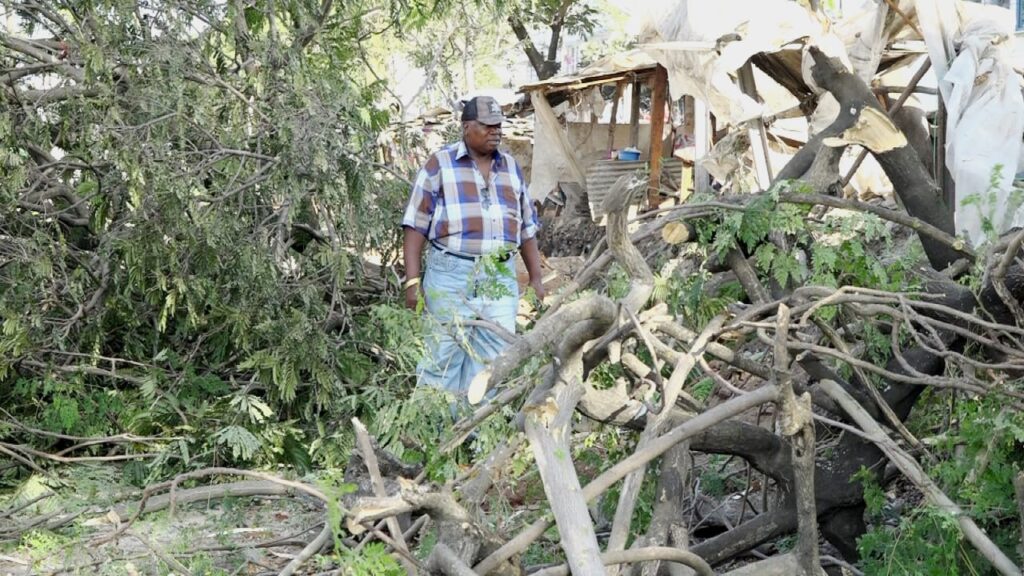By Johnson Chengo
A coast based environmentalist Dr. Edwin Mwinga Chokwe has raised concerns after a private developer illegally cut down trees along the Machakos-Liwatoni road.
The vocal environmentalist staged an on-site protest against the private developer’s alleged inaction over illegal cutting down of twenty indigenous trees planted on a pedestrian walk as he encroached on erecting a concrete wall.
The developer, who has leased a go-down belonging to the old Kenya railways station in Mombasa, is alleged to have cut down the trees without the approval of the Kenya Forest Services, NEMA and Mombasa County Government.
The trees were cut down to pave way for a perimeter wall being constructed around the go-down.
Mwinga who also chairs the Clean Mombasa CBO, said the indigenous trees were planted over twenty years ago by jua kali workers and food vendors along the industrial area to protect them from the extreme heat in Mombasa.
“Last Thursday, we got wind that the said developer was cutting the trees. We came here with a KFS official and he agreed he will not cut the trees”
“But to our surprise, we received calls from traders on Monday informing us that the trees have been cut down and some of their structures destroyed,” said Mwinga.
Mwinga is now calling on the county, KFS and NEMA to come out clear on the matter and explain who approved the developer to cut and uproot the indigenous trees that have over the years provided shade and clean breathing air to the people operating around the area.
He said that the cutting of the trees has also destroyed the ecosystem as a number of bird species lived on the trees.
The developer is also alleged to have gone beyond the initial boundary for the perimeter wall erected by the railways company and extended his new wall to the road reserve, affecting the trees and pavement.
“We feel like we have lost our inheritance by the cutting down of these trees, both the county, Nema and KFS should explain to us what happened. We also want this exercise stopped immediately,” Mwinga said.
Last December, President William Ruto, while celebrating his 56th birthday, launched a tree restoration program at Ngong Hills signaling the beginning of the government’s ambitious plan to plant 15 billion trees by 2032.
The president called on all Kenyans to join in the challenge and plant at least 100 trees each and also inculcate the culture of tree planting.
“Whatever is happening here is totally going against the president’s plans, we have to be aware of climate change and issues of biodiversity. For a small island like Mombasa people should not cut down trees, they should instead plant more,” Mwinga said.
The juakali people working around the area also expressed concerns over the manner in which the trees were cut down leaving the area exposed to extreme heat.
“I have been working here since 1988, I was among the people who planted these trees. It pains me a lot to see that someone will just wake up one day and decide to cut them down,” said Hillary Tieno.
“We planted these trees for our shade and our environmental protection, by cutting them down there will be no shade and the air we breathe shall be contaminated because this is an industrial area,” he added.
The cutting of the trees has also destroyed livelihoods for food vendors who were operating their businesses under the shades.
Halima Salim, one of the 11 women operating food kiosks along the area said that they were not given any notice to move as some of their structures were destroyed.
According to her, the developer kicked them out from one section of the road in 2016 forcing them to move to their current area, only for them to start receiving threats from last July to also leave the area.
“A number of us are single parents struggling to earn a living for our families, why should we be treated like this in our own country? The developer has even gone ahead to call us street urchins,” said Salim.
Efforts to get comments from the developer whose office is near the incident area were futile as no one was willing to address the media.


